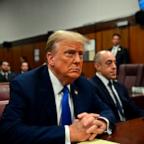Support for Iraq Pullout Grows in the Senate
Symbolic vote shows "change is in the air."
WASHINGTON, D.C., May 16, 2007 — -- The U.S. Senate signaled that patience with the Iraq War on both sides of the aisle is wearing dangerously thin. In a vote to pull out troops, the sentiment for quick withdrawal has gained strength.
The votes were merely symbolic, but the symbolism spoke volumes. What might have been considered radical a few weeks ago is now mainstream thought.
On the eve of the House-Senate conference meeting on an Iraq funding bill, the votes could not have reassured the White House.
A majority of Republicans voted for a bill offered by Sen. John Warner, R-Va., that months ago would have been considered heresy. The bill would tie aid to the Iraqi government to specific benchmarks it needs to meet, require President Bush to report to Congress on the status of the war, and authorize the withdrawal of U.S. troops from Iraq if its government were to vote for such a move.
"The Iraqi government ... needs to understand that they're running out of time to get their part of the job done," said Senate Minority Leader Mitch McConnell, R-Ky.
But even more strikingly, voting on a bill offered by Sen. Russ Feingold, D-Wis, and Senate Majority Leader Harry Reid, D-Nev, a majority of Senate Democrats -- 28 out of 51 -- voted to withdraw all U.S. combat troops from Iraq within four months, and have all troops gone by next March.
Supporters included every Senate Democrat running for president -- Hillary Clinton of New York, Barack Obama of Illinois, Joe Biden of Delaware and Chris Dodd of Connecticut.
"There are those of us who believe very strongly that redeployment of our forces should begin and terminate within the year," said Dodd, D-Conn.
"It is clear change is in the air," said Sen. Dick Durbin, D-Ill.
Neither measure achieved the needed 60 votes to come up for an official vote, though the Warner Amendment came closest, with 52 votes. But the procedural moves marked a startling shift as the once-cautious Democrats now try to outflank one another on the anti-war left.




